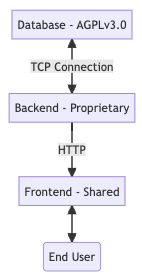Let's say I'm building an app consisting of a frontend, backend and database.
The database software is AGPLv3.0 licensed and running on the database server.
The backend is proprietary, running on the backend server, and it communicates with the database.
The frontend is distributed to end users, it communicates with the backend.
Am I required to distribute the database's source code (and/or the modifications I make to the database's source code) to end users?
(The backend is not a mere wrapper around the database, the exposed API has no resemblance to the underlying database, the end users consider themselves users of, say, a social network (and not a database hosting service).)
